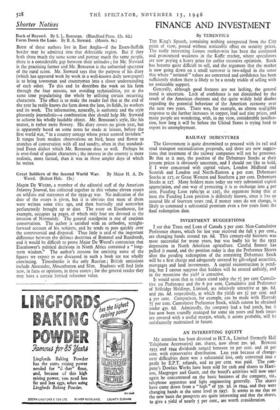By TERENTIUS
THE King's Speech, containing nothing unexpected from the City point of view, passed without noticeable effect on security prices. The really interesting feature market-wise has been the continued and pronounced weakness in the Kaffir market, where speculators are now paying a heavy price for earlier excessive optimism. Stock has become quite difficult to sell, and the argument that the market is now going down on a small turnover is two-edged in the sense that where " notional " values are concerned and confidence has been sufficiently shaken there is likely to be a steady trickle of selling with no noticeable support.
Generally, although good features are not lacking, the general trend is uncertain. Lack of confidence is not diminished by the result of the American elections and the quite widely held doubts regarding the potential behaviour of the American economy over the next two years. There was, for example, an almost negligible response to the further increases in copper, lead and zinc prices, and many people are wondering, with, in my view, considerable justifica- tion, how long it will be before the United States is trying hard to export its unemployment.
RAILWAY DEBENTURES
The Government is quite determined to proceed with its rail and road transport nationalisation proposals, and there are now sugges- tions that treatment of the railway companies will not be generous. Be that as it may, the position of the Debenture Stocks at their present prices is obviously uncertain, and I should not like to hold, if I were concerned with capital values, London Midland and Scottish and London and North-Eastern 4 per cent. Debenture Stocks at 117, or Great Western and Southern 4 per cent. Debenture Stocks at 127. Many holders must today see very substantial capital appreciation, and one way of protecting it is to exchange into 4 per cent. Funding Loan 1960/90 at 1201, the argument being that at least the Funding Loan position is definitely known, since it has an assured life of fourteen years end, if money rates do not change, is likely to command a substantial premium even a few years from the final redemption date.
INVESTMENT SUGGESTIONS
I see that Trust and Loan of Canada 5 per cent. Non-Cumulative Preference shares, which for last year received the full 5 per cent., are changing hands around 19s. 6d. This century-old business was most successful for many years, but was badly hit by the 1932 depression in North American agriculture. Careful finance has pulled it round, and the position today is that the Preference Shares after the pending redemption of the remaining Debenture Stock will be a first charge and adequately covered by gilt-edged securities, mortgages and land investments. A capital reconstruction is pend- ing, but I cannot suppose that holders will be treated unfairly, and in the meantime the yield is attractive.
It would seem that as values stand today the 72 per cent Cumula- tive 1st Preference and the 6 per cent. Cumulative and Preference of Selfridge Holdings, Limited, are relatively attractive at 39s. 6d. and 29s. 6d. respectively, at which the yields are 31 per cent. and 4 per cent. Comparison, for example, can be made with Harrods 71 per cent. Cumulative Preference Stock, which cannot be obtained under 45s. 6d. Admittedly, the company had a bad patch, but it has now been soundly managed for some six years and both issues are covered with a useful margin, which, it seems probable, will be satisfactorily maintained in future.
AN INTERESTING EQUITY
My attention has been directed to H.T.A., Limited (formerly Hall Telephone Accessories) zos. shares, now about 20S. 9d. Between 1935 and 1944 dividends ranged between to per cent. and 16 per cent. with conservative distribution. Last year because of change- over difficulties there was a substantial loss, only converted into a profit by E.P.T. refunds, and to per cent. was paid. The com- pany's Dowlais Works have been sold for cash and shares to Harri- son, Macgregor and Guest, and the board's activities will now once again be concentrated on the basic business of the company, viz., telephone apparatus and light engineering generally. The shares have come down from a " high " of 33s. 3d. in 1944, and they were changing hands at the same level in 1937. It seems to me that on the new basis the prospects are quite interesting and that the shares, to give a yield of nearly 5 per cent., are worth consideration.


































 Previous page
Previous page